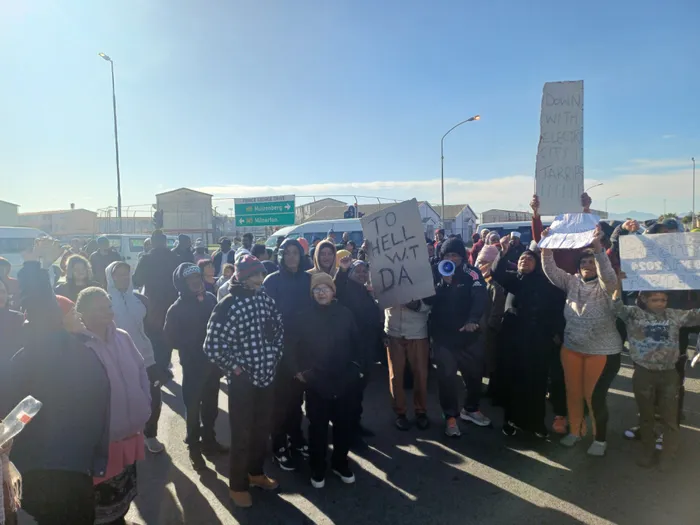‘Electricity is becoming a big problem’

Lavender Hill residents took to the streets to protest the ever-rising cost of electricity.
Residents took their frustrations about electricity to the streets last week when they closed down Prince George Drive and Hek Road in Lavender Hill.
The protest, on Thursday August 22, was in response to the installation of new prepaid meters in the broader Lavender Hill area and increased electricity tariffs - the latest of these increases was implemented on July 1.
Many who attended bemoaned the increases and said the cost of living has become too high and electricity is costing them more than what it should. Some, including pensioners, said they have to resort to borrowing money from neighbours or loan sharks to keep the lights on.
Community leader Aysha Davids said there were multiple reasons for the protest.
The installations of the prepaid meters boxes in the area had been authorised without notification to the community or prior public participation, said Ms Davids. “Then if you’re not home the contractors switch off your electricity and people are then left without electricity. Another issue we have is that contractors and companies who do the installations are not local. Why is the City not using labour from the community to work? The unemployment rate is so high in our communities and we have electricians and people capable of doing the work,” said Ms Davids.
Mark Schrikker from organisation 7945 said the protest is a statement to everyone in the Western Cape.
“The whole of the Western Cape will be affected and it is time to stop accepting what is happening or what is put in front of us.
“The new boxes are taking R50 to R100’s electricity a day, that is insane. Working people can’t even afford that and pensioners who only get R2 180 a month have to spend almost all of that money on electricity, what about food and other expenses?” asked Mr Schrikker.
He added that the only way they could get the government’s attention was to protest and close down Prince George Drive: “Our people are starving and not able to get by and no one is listening, it is time we make them listen.”

Brandon Felix, who initially refused the installation of a new meter box at his home in St Montague Village, said he was threatened by the contractor that his electricity would be cut within 14 days.
“They put the new box in but since then we’ve had to buy R150 worth of electricity a day, it used to be R50 for two days. We’re too scared to put the kettle on or make a pot of food on the stove because it would take too much electricity. We want the old boxes back,” said Mr Felix.
Pensioner Constance Adonis shared the sentiments and said her household has resorted to using gas to cook but she can’t always afford it because most of her money now goes towards electricity.
“Yesterday I went to borrow money from someone to buy electricity and then I have to pay interest on that money. We are suffering and we’re worried about how we will be able to make it through every month,” said Ms Adonis.
The City of Cape Town said it noted the protest in Lavender Hill. Despite specific questions sent by Southern Mail to the City about the issues raised, the City sent a statement in response and mentioned Eskom’s tariff hikes and said the protest was about meter investigation cases.
“The City notes the protest in Lavender Hill related to disputed electricity meter tampering incidents,” said Mayoral committee member for energy, Xanthea Limberg. “In recent years, the City has seen a spike in meter tampering cases largely linked to soaring energy costs that are driving South Africa’s cost of living crisis, impacting all residents and especially vulnerable households.”
She said the City has social support as well as Free Basic Electricity grants and a lifeline tariff available to qualifying residents and often absorbs part of Eskom’s tariff hikes.
Ms Limberg added in recent years, the City has observed a notable increase in prepaid meter tampering cases and there are currently more than 12 000 meters that have been established as having been tampered with. Meter tampering occurs when a person interferes with the City’s electricity meter equipment to pay less or not pay for electricity at all.
“It is our view that these incidents are linked to the growing cost of living crisis driven by unaffordable and unreasonable electricity tariff hikes proposed by Eskom and approved by the National Energy Regulator (Nersa) over the years.”
Ms Limberg said the meter replacement is compulsory and all homes with City meters must allow the City and its contractors reasonable access to check for faulty meters or irregular power usage and that interfering with City employees and contractors performing their official duties is illegal.
She also added households use more electricity in winter which drives up costs and that when illegal tampering is identified and rectified at a household it would be normal for the consumer to see an increase in their electricity costs, due to paying for the actual electricity usage in their household and possible debt recovery action for the tampering will also be instituted.
“The City’s beneficial meter replacement programme does not increase costs. In fact, replacing the old meters with new prepaid meters could help households to monitor and bring down costs and the unit price of electricity between the old credit meters and the new prepaid meters is exactly the same,” said Ms Limberg.
Related Topics: